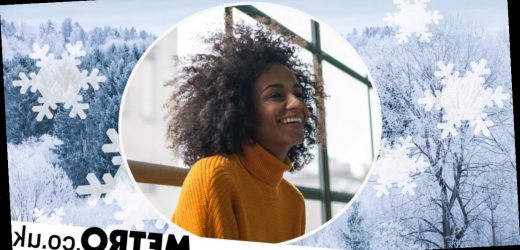Winter is especially challenging for Afro-textured hair.
Naturally dry and prone to breakage, Afro hair needs additional care and attention to nourish it and keep it looking its best over the colder months.
Couple that with the dryness of sitting at home all day with the heating on, and your kinks and coils are likely going to be crying out for moisture and nourishment.
We have asked some experts in the field to share their top tips on how to care for your curls when the temperature drops.
Prevent breakage
When hair comes into contact with wool hats and scarves, the fragile hair strands can become damaged.
‘If you notice that your hair is breaking at certain points, the reason could be your scarf or hat. Wool, cotton, and some other materials may increase breakage as a result of friction,’ says Kam Davis, CEO and Founder of vegan hair care brand Nylah’s Naturals.
‘So, the best strategy in this case is to prevent the problem, not treat it. Try using silk scarfs under your winter hats or switching to a silk-linen hat overall.’
Silk tends to be one of the best materials to wear around your head and shoulders, as it doesn’t absorb moisture, and is gentle on hair so as to prevent frizz and breakage.
Wrapping your hair in a silk scarf before you go to sleep is recommended to protect it overnight.
Seal in moisture
Cold exposure causes hair strands to lose moisture more rapidly, so it’s important to use products that nourish hair and seal in moisture.
Nylah’s Naturals Moisture Retention Leave In harnesses the power of ingredients including davina flower, jojoba oil, and ginger oil to penetrate deeply into the hair fibre and improve hair moisture content, strength and elasticity.
Avoid extra heat where possible
It’s not only cold air that damages hair, but dry air too, particularly from central heating.
Over the winter months, it is best to avoid or limit the use of any heating devices when you are drying or styling your hair.
Using a portable humidifier at home is great for both skin and hair as it replenishes dry air with moisture to create a healthier environment.
As part of your winter hair washing routine, try to let your hair dry naturally as often as possible and, where possible, braid your locks overnight for styling without the risk of heat damage.
‘Braiding or banding are two great ways to add extra curl definition without applying heat,’ says Kam.
‘Let the hair dry a little, then style in braids as desired and leave them overnight. When you wake up the next morning, you’ll have beautiful, defined curls without the damage.’
Switch up your products
While you might have your go-to hair products, it’s important to ensure that you are using a shampoo formulation that is designed to meet the specific needs of Afro textured hair.
Scrutinize your labels and make sure your formulation is free from harsh sulphates, parabens, minerals and silicones a great way to gently care for your hair to get it looking its best.
Nylah’s Naturals Strength and Shine Thickening Shampoo is rich and creamy, delicately cleansing the hair without stripping it of moisture and shine.
You might want to switch products if you feel as though your hair is not responding to your normal products in the same way it does during the warmer months.
‘Many women find that their hair needs products that are richer to get them through winter,’ says Salem Wynter-Baxter, founder of Root2tip and ‘hairducation’ expert.
‘Your strands will be robbed of moisture through the wearing of wooly hats, also the constant rubbing on coats or scarves.’
Salem suggests investing in a heavy butter or richer crème, like the Root2Tip Quench Anti-breakage creme.
‘During winter I swear by my Natural & Whipped Beauty Butter, it seals in much needed intense moisture on all hair types,’ says Salem.
‘Oils or shea butter alone will not suffice in the winter, water first is the approach, so don’t be afraid to try something new.’
Remember protective hairstyles
In winter, braids, goddess locs, straight-backs, and other variations are not just a question of style.
Keeping the ends of your hair up and out of the way is especially important in winter to protect the hair from tangling, breakage, and weather damage.
‘I have always chosen to protective style and harvest my hair-growth during the cold months,’ says Salem.
‘By harvest I mean I put my hair in a protective style, be it twists or braids with extensions, in order to freeze the healthy state it’s in and add length to it.
‘Afro hair grows when it is not manipulated regularly. Winter is the perfect season to grow your hair out. Especially if you have spent much of the year trying out different styles. Our hair can become weathered and appear worn, if we are constantly trying something new.
‘A protective style will rest your hair and protect it from the elements. My hair hates the cold weather and it seems many of you agree, as women I speak to often choose the colder season to give their hair a vacation.’
If you do choose to protective style, Salem says you should ensure that it is safely applied to avoid and kind of traction alopecia or unnecessary breakage, also ensure you keep up the daily moisture routine.
Exclusive discount code
Use Metro20 for 20% off all Root2Tip products.
Do you have a story to share? We want to hear from you.
Get in touch: [email protected].
Source: Read Full Article



